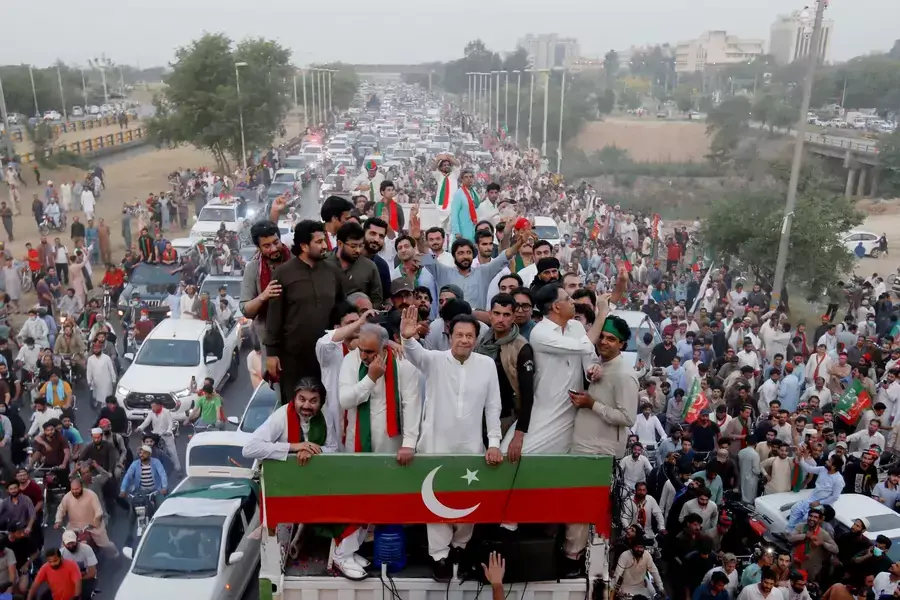The President’s Inbox Recap: Pakistan in Crisis

The latest episode of The President’s Inbox is live. This week Jim sat down with Sadanand Dhume, a senior fellow at the American Enterprise Institute and a South Asia columnist with the Wall Street Journal.
Pakistan in Crisis, With Sadanand Dhume
Sadanand Dhume, a senior fellow at the American Enterprise Institute and a South Asia columnist for the Wall Street Journal, sits down with James M. Lindsay to discuss the political, economic, and climate crises roiling Pakistan.
They discussed the crises wracking Pakistan.
Here are three highlights from the conversation:
More on:
1.) Former Prime Minister Imran Khan is challenging the Pakistani military’s control of the country in what Sadanand calls “a clash between Pakistan’s most popular leader and its most powerful institution.” Khan is one of Pakistan’s true national figures. He led Pakistan to its first and only cricket world championship, raised funds to establish Pakistan’s first and only cancer hospital, and opened up a technical college. He also created the political party that brought him to power as prime minister in 2018. However, the magic Khan displayed on the pitch escaped him when it came to governing. Last April, he was ousted as prime minister on a no-confidence vote. The move ironically rejuvenated his popularity. Suddenly, he became the people’s trumpet, attacking entrenched institutions, particularly the military. The institutions fought back. Earlier this month, he was arrested on corruption charges. Mass protests quickly swept the country. Pakistan’s politics is now in uncharted terrain.
2.) Pakistan’s political crisis comes on top of economic, climate, and terrorism crises. The country’s foreign exchange reserves have plummeted to just $4 billion, all the while the International Monetary Fund (IMF) is reviewing a bailout package to prevent economic collapse. Floods triggered by historic monsoons last summer covered a third of the country in water. Many towns and villages are still struggling to recover—and fear they will see more flooding when the monsoons return later this year. The country’s infrastructure has long been neglected. Its aging power grid struggles to meet demand for electricity, making blackouts a part of daily life. Terrorism is also on the rise—largely due to the return of the Taliban to power in Afghanistan. Earlier this year, a suicide bomber killed more than 100 people gathered in a Peshawar mosque. A polycrisis has engulfed the country.
3.) Pakistan’s neighbors are watching its crises closely. Pakistan owes China some $30 billion. Beijing wants to get re-paid. It also wants to maintain good ties with Islamabad, which it sees as crucial to it plans to dominate in Asia. India, in Sadanand’s judgment, views Pakistan’s predicament “mostly with glee and schadenfreude.” New Delhi is not likely to take advantage of Pakistan’s problems, but it has to worry that a weakened Pakistani state could increase the terrorist threat to India. As for the United States, the Biden administration has taken a hands off approach. That’s partly because Khan has repeatedly blamed the United States for his ouster and many of Pakistan’s woes. It’s also because Washington is suffering from what Sadanand calls “Pakistan fatigue.” In the wake of the U.S. withdrawal from Afghanistan, Pakistan is far less important to the United States.
Sadanand has written extensively on Khan’s ouster, his arrest, and the implications for Pakistan. He wrote a piece immediately after Khan’s ouster last April that detailed how Khan has rewritten “the rules of Pakistani politics” by challenging Pakistan’s military. He argued in another op-ed for the Wall Street Journal that if Pakistan’s army collapses, then the country’s collapse will follow.
CFR’s Global Conflict Tracker briefing on Pakistan is also worth checking out.
More on:
 Online Store
Online Store